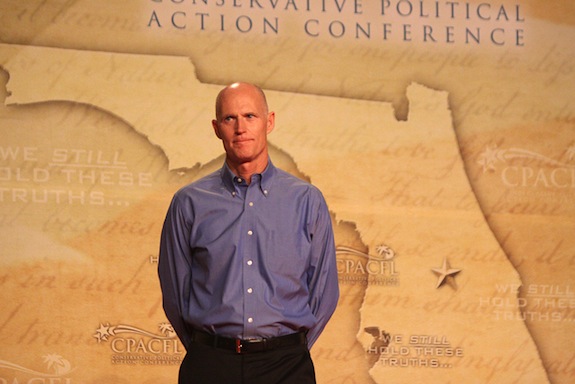
Gov. Rick Scott will not implement the health care reform law in Florida any time soon. (Photo by Gage Skidmore.)
By Ashley Lopez
Florida Center for Investigative Reporting
Next week, the Supreme Court of the United States is expected to rule on the constitutionality of the Affordable Care Act (ACA), the health care reform law signed by President Obama in 2010.
This week, Gov. Rick Scott said on a conference call hosted by right-wing think tanks that Florida wouldn’t rush to implement the health care reform law.
The Tampa Bay Times reports that “even if the Supreme Court sides with the federal government, he would remain hopeful that Mitt Romney is elected president and overturns provisions of the Affordable Care Act or Congress acts to repeal it.”
In the meantime, Scott said, Florida will continue to resist implementation until it is clear Obama’s health care reform is “the law of the land.”
It was just a couple months ago that Scott began publicly saying that ACA was not the “law of the land” — an assertion that is just false no matter how you feel about the law.
While some judges have found the law to be unconstitutional, none has told states to stop implementing it.
Most of the more than 30 cases challenging the law have been dismissed, are awaiting arguments or — in four cases, according to the Justice Department — upheld the law. While some judges have found the law to be unconstitutional, none have told states to stop implementing it. Instead, they’ve encouraged the Supreme Court to settle the issue.
One subject of constitutional controversy is the law’s requirement that people purchase health insurance or pay a penalty — known as the “individual mandate” — which starts in 2014.
A Virginia judge who struck down just the individual mandate in December 2010 didn’t freeze implementation of the law. An appeals court overturned his decision, anyway, and the Supreme Court has been asked to review the case.
In the most significant challenge to the law, which was filed by Florida, 25 other states, two individuals and the National Federation of Independent Businesses, a district court judge found parts of the law unconstitutional, including the individual mandate. Judge Roger Vinson concluded the mandate couldn’t be severed from the legislation, and so struck down the whole law in January 2011. But he said states could continue implementing it as the appeals process moved forward. The appeals court also found the individual mandate unconstitutional, but said that it could be struck down alone, preserving the rest of the law. The Supreme Court has agreed to review the case.
In short, the health care reform law has not been stopped by any court and has been implemented, in part, all over the country. It is indeed “the law of the land.”
Laurence Tribe, a Harvard law professor who has argued 35 cases before the U.S. Supreme Court, explained to PolitiFact that Scott should move forward in implementing the law until the Supreme Court rules it is unconstitutional.
“We would not have a functioning system of government if officials could take the law into their own hands whenever they held the view that Congress had exceeded its authority,” Tribe said.
Either way, just days shy of a ruling, the Times reports:
The governor said he isn’t concerned about the billions of dollars in federal funding that Florida would no longer receive if the law is struck down. Under health care reform, states will be allocated additional money to increase the number of low-income residents who are served by Medicaid and to pay doctors more for provide services.
These provisions of the Affordable Care Act do more harm than good, Scott said.
“Because the cost is so high, it raises taxes which impacts businesses, it impacts jobs,” he said. “So the real cost is going to be if its declared unconstitutional and not repealed.”
He was also critical of a component of health care reform that calls for the creation of health exchanges so consumers can compare prices and buy insurance under the individual mandate. So far, Florida has refused to accept money from the federal government to assist with the implementation of health exchanges. If those provisions are struck down by the Supreme Court, Florida wouldn’t pick up that mantle, Scott said.
Scott’s foray into politics before becoming governor was not the mayor of a city, or a lawmaker of any sort. Scott was the former CEO of a private hospital chain who set his sights on fighting Obama’s health care reform law.
Here is a description of Scott’s effort in The Washington Post from 2009:
“Before government rushes to overhaul health care, listen to those who already have government-run health care,” intones Rick Scott, founder of a group called Conservatives for Patients’ Rights. “Tell Congress to listen, too.”
Scott, a multimillionaire investor and controversial former hospital chief executive, has become an unlikely and prominent leader of the opposition to health-care reform plans that Congress is expected to take up later this year. While disorganized Republicans and major health-care companies wait for President Obama and Democratic leaders to reveal the details of their plan before criticizing it, Scott is using $5 million of his own money and up to $15 million more from supporters to try to build resistance to any government-run program.
The campaign is being coordinated by CRC Public Relations, the group that masterminded the “Swift boat” attacks against 2004 Democratic presidential candidate John F. Kerry, and is inspired by the “Harry and Louise” ads that helped torpedo health-care reform during the Clinton administration.
By all intents and purposes, for Gov. Scott, the campaign hasn’t ended.
